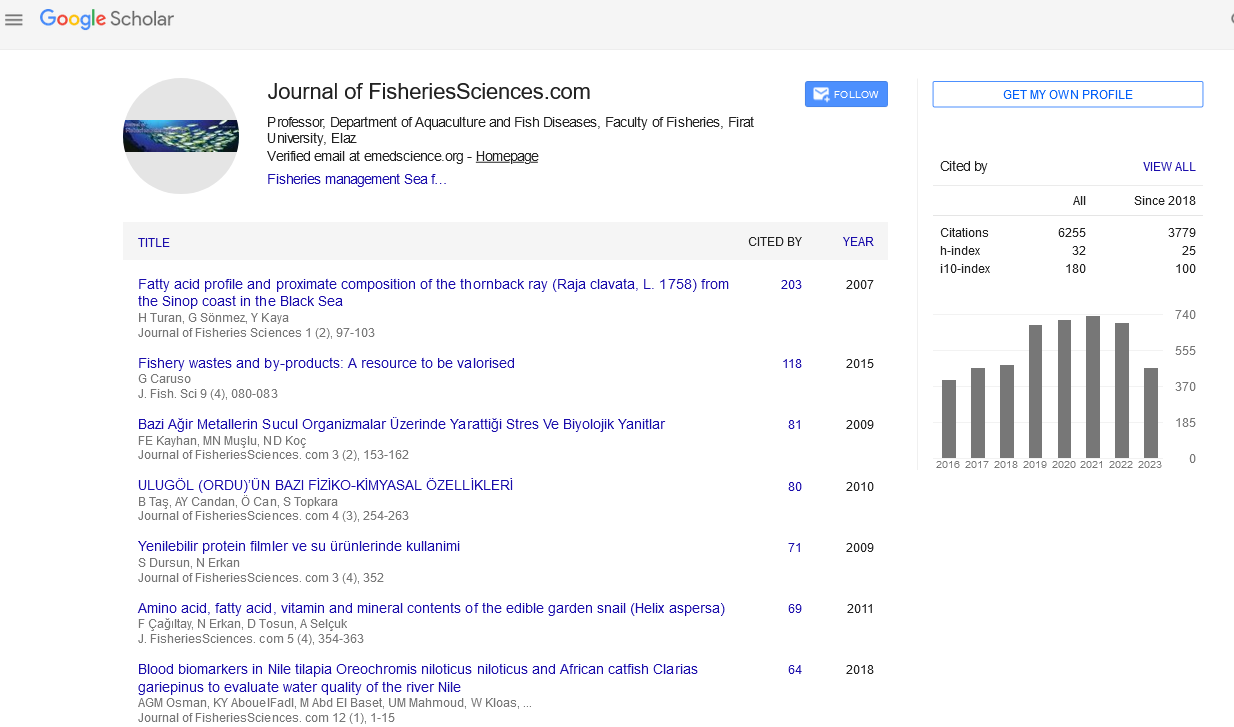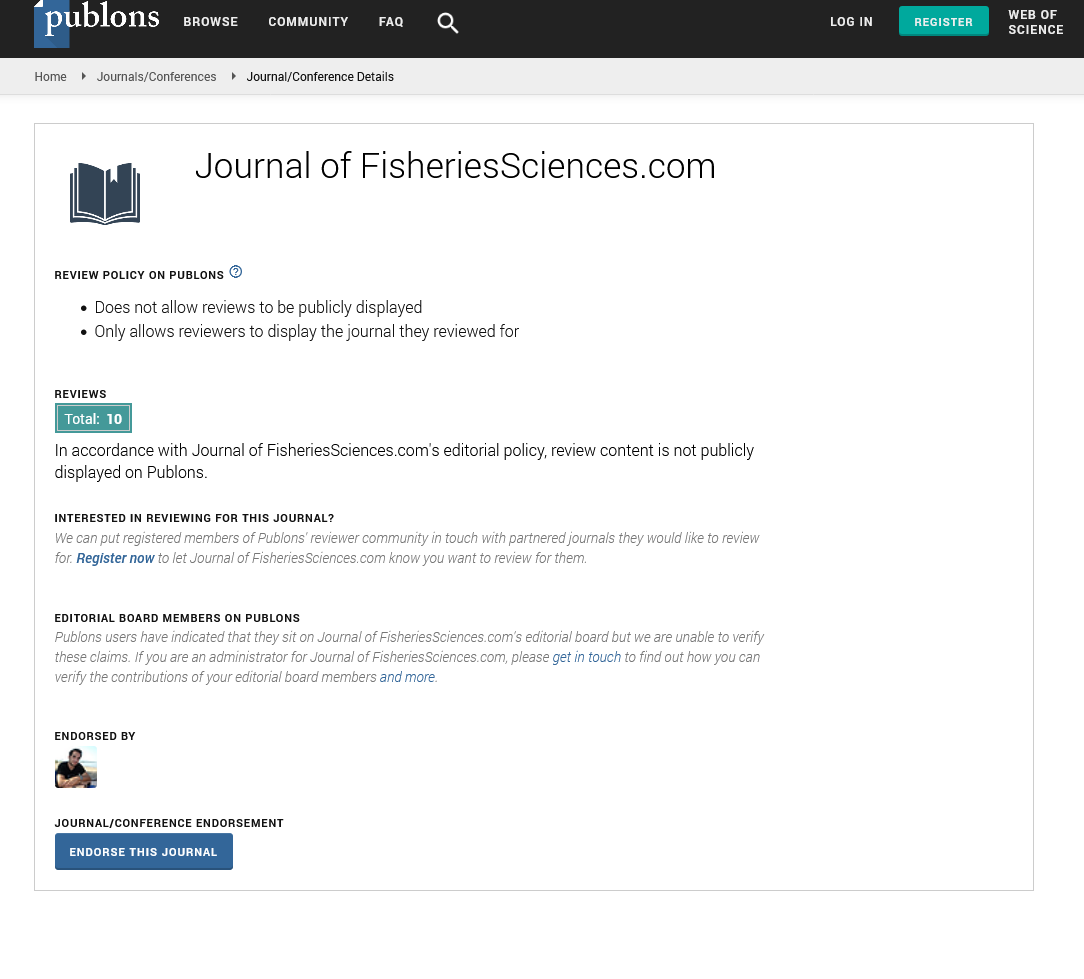Perspective - (2024) Volume 18, Issue 6
The Wonders of Marine Biology: Exploring the Depths of Our Oceans
Jaari Intra*
Department of Biology and Ecology of Fishes, University of Marine Science, Salta, Argentina
*Correspondence:
Jaari Intra, Department of Biology and Ecology of Fishes, University of Marine Science, Salta,
Argentina,
Email:
Received: 03-Dec-2024, Manuscript No. IPFS-24-15412;
Editor assigned: 06-Dec-2024, Pre QC No. IPFS-24-15412 (PQ);
Reviewed: 20-Dec-2024, QC No. IPFS-24-15412;
Revised: 23-Dec-2024, Manuscript No. IPFS-24-15412 (R);
Published:
31-Dec-2024
Introduction
Marine biology is a vibrant field of science that delves into the
study of organisms in the ocean and other saltwater
environments. This branch of biology examines the complex
interactions between marine creatures and their habitats,
ranging from the sunlit surface to the dark depths of the deep
sea. As we advance our knowledge of the marine world, we
uncover the intricate and often astonishing life forms that
inhabit our planet's vast oceans.
Description
Understanding marine ecosystems
Marine ecosystems are incredibly diverse and include various
environments such as coral reefs, kelp forests, mangroves and
deep-sea trenches. Each ecosystem supports a unique set of
species adapted to specific conditions. Coral reefs, often
referred to as the "rainforests of the sea," are home to a myriad
of marine species. They provide essential services such as
habitat, food and protection for countless organisms. Similarly,
kelp forests are underwater areas dominated by large brown
algae, which create dense underwater forests that support a
diverse array of marine life.
The role of marine biologists
Marine biologists are scientists who study marine organisms
and their interactions with the environment. Their research is
crucial for understanding marine biodiversity, ecosystem
dynamics and the impact of human activities on marine
environments. By examining the physiology, behavior and
genetics of marine species, marine biologists can contribute to
conservation efforts, sustainable management practices and the
development of new technologies.
One key area of research is the study of marine species'
adaptations to their environments. For instance,
bioluminescence, the production of light by living organisms, is a
fascinating adaptation found in many deep-sea creatures. This
ability allows organisms to attract prey, communicate or
camouflage themselves in the dark depths of the ocean.
Marine conservation and environmental challenges
Marine conservation is a pressing issue as human activities
increasingly impact ocean health. Overfishing, pollution, climate
change and habitat destruction are significant threats to marine
ecosystems. Overfishing depletes fish populations and disrupts
food chains, while pollution from plastics and chemicals can harm
marine life and degrade habitats. Climate change leads to ocean
warming, acidification and sea-level rise, further exacerbating
these problems.
Efforts to address these challenges include the establishment
of Marine Protected Areas (MPAs), which are designated regions
where human activities are regulated to conserve marine life
and habitats. MPAs help to restore and protect marine
ecosystems, allowing them to recover from the effects of
overfishing and pollution. Additionally, international agreements
and policies aim to reduce marine pollution, limit fishing quotas
and promote sustainable practices.
The importance of marine research
Marine research plays a vital role in advancing our
understanding of the ocean and its inhabitants. Research
also contributes to the discovery of new resources and
technologies. For example, marine organisms have inspired the
development of new pharmaceuticals, materials and
biotechnological applications.
One notable example is the use of marine-derived compounds
in medicine. For instance, compounds from marine sponges
have been found to have anticancer properties and substances
from seaweeds are being explored for their potential in treating
various health conditions. These discoveries highlight the value
of marine biodiversity not only for ecological balance but also
for human health and well-being.
Exploring the deep sea
The deep sea, defined as the part of the ocean below 200
meters, is one of the least explored and most mysterious regions
of our planet. It is home to unique and often bizarre life forms
adapted to extreme conditions such as high pressure, low
temperatures and complete darkness. Research in this area is conducted using specialized equipment such as Remotely
Operated Vehicles (ROVs) and manned submersibles.
Deep-sea exploration has led to the discovery of remarkable
species, such as the giant squid and the bioluminescent
anglerfish. These creatures possess adaptations that allow them
to thrive in the harsh deep-sea environment. For example, the
anglerfish uses a bioluminescent lure to attract prey, while the
giant squid has large eyes adapted to see in the dark.
Conclusion
Marine biology is a dynamic and essential field that uncovers
the wonders of the ocean and its diverse inhabitants. Through research and conservation efforts, we can better understand and
protect the intricate balance of marine ecosystems. By involving
the public in scientific research and conservation efforts, we can
build a collective effort to protect marine ecosystems and ensure
their sustainability for future generations.
Citation: Intra J (2024) The Wonders of Marine Biology: Exploring the Depths of Our Oceans. J Fish Sci. Vol.18 No.6






